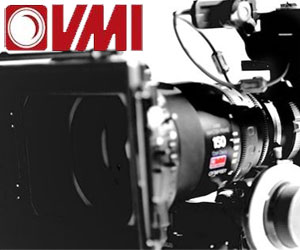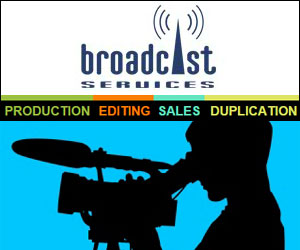Broadcast News
10/08/2012
Back Up Or Archive?

With the increased popularity and wider usage of file-based cameras within the broadcast Industry, new responsibilities have emerged for this valuable media content. Gone are the days of being able to resort to a Digibeta tape on a shelf if the media was unfortunately lost or deleted.
Similarly, as picture quality and frame sizes have increased, so have media file sizes. Larger storage devices, typically of the shared storage variety, are required to store the ever-increasing required capacity during post production. And, while storage is readily available, online storage still carries a cost premium.
We are also in a period where even more media is expected to be kept online or at least nearline. The traditional offline-then-online workflow in post is being replaced, with users preferring to work with higher or even full resolution media from the start to the finish of projects. We are even fast approaching the point where re-capturing / re-importing isn’t acceptable!
Here’s the issue. With only a single file copy of the raw rushes from a file-based camera and your shared storage rapidly filling with media you also need to access, what should you do? Backup and archive? Just archive? Just backup? And what’s the difference between them? In essence they are both very similar, the key difference is the lifespan of each.
Typically backups have a short retention period aimed at providing a copy of the original file that can be restored after possible data loss. The secondary purpose of backups is to recover data from an earlier time; this would tend to work in conjunction with an incremental/ snapshot policy. For example, to complete a full backup of all data on a Saturday night, then on each subsequent night, look for changes and backup these each day. This would allow data to be restored for up to seven days and reduce backup times. Backups also often represent a simple form of disaster recovery, the complete backup written on the Saturday night might be written to duplicate LTO tapes, one of which is taken offsite.
Unlike backup, an archive typically has a long retention period and they are employed for a variety of reasons, both commercial and operational.
A heritage archive, sometimes referred to as a deep archive, keeps the content for reuse at a later date. The BBC has a huge heritage archive with its own preservation department in control of the transformation from a physical archive of film and cassette to a file-based archive. Another reason for archiving is compliance, where copies are retained in accordance with established guidelines or specifications. Again, this would tend to be for a long retention period but after time, it may possibly be removed. A further and commonly used form of archiving is for economic reasons; moving content into an archive to free up online storage capacity, while keeping it available for fast and easy retrieval.
Archiving also provides an important opportunity to add additional metadata to media, for example by populating customised metadata tags with extracted information. This metadata will help when searching the archive to locate a single asset or group of assets meeting the search criteria. More often than not, the archive works in conjunction with an asset management system, providing decisions surrounding the annotation, cataloguing, storage, and archiving of the assets.
Archiving and backup systems can have two distinct and complementary functions within a media organisation. These two principles can be applied together to create an effective workflow addressing the original concern to protect valuable content, along with the need to maintain appropriate levels of online shared storage while maintaining accessibility to the current media and legacy material.
In such a workflow the camera files would be backed up on arrival with one file copy for the backup, written to two LTO tapes, one being taken offsite for disaster recovery. A second independent file copy would be made to the shared storage ready for editing. It’s important to make independent copies so any corruption wouldn’t be transferred to the shared storage from the backup. The project would be edited on the online shared storage as normal, but once completed it would then be archived to less expensive nearline storage and also to LTO tape, where again, a duplicate could be used to provide disaster recovery.
The completed project could remain on nearline storage for a fixed period to insure that if it was required within that period it could be restored quickly; after that time it would then be restored from LTO tape. With the archive being searchable, historic projects and media would be straightforward to locate and quickly resorted.
Once the project is archived, the LTO tapes which were used to provide the original backup for editing can be recycled.
www.root6.com
viewer.zmags.com/publication/381c52e3#/381c52e3/1
Similarly, as picture quality and frame sizes have increased, so have media file sizes. Larger storage devices, typically of the shared storage variety, are required to store the ever-increasing required capacity during post production. And, while storage is readily available, online storage still carries a cost premium.
We are also in a period where even more media is expected to be kept online or at least nearline. The traditional offline-then-online workflow in post is being replaced, with users preferring to work with higher or even full resolution media from the start to the finish of projects. We are even fast approaching the point where re-capturing / re-importing isn’t acceptable!
Here’s the issue. With only a single file copy of the raw rushes from a file-based camera and your shared storage rapidly filling with media you also need to access, what should you do? Backup and archive? Just archive? Just backup? And what’s the difference between them? In essence they are both very similar, the key difference is the lifespan of each.
Typically backups have a short retention period aimed at providing a copy of the original file that can be restored after possible data loss. The secondary purpose of backups is to recover data from an earlier time; this would tend to work in conjunction with an incremental/ snapshot policy. For example, to complete a full backup of all data on a Saturday night, then on each subsequent night, look for changes and backup these each day. This would allow data to be restored for up to seven days and reduce backup times. Backups also often represent a simple form of disaster recovery, the complete backup written on the Saturday night might be written to duplicate LTO tapes, one of which is taken offsite.
Unlike backup, an archive typically has a long retention period and they are employed for a variety of reasons, both commercial and operational.
A heritage archive, sometimes referred to as a deep archive, keeps the content for reuse at a later date. The BBC has a huge heritage archive with its own preservation department in control of the transformation from a physical archive of film and cassette to a file-based archive. Another reason for archiving is compliance, where copies are retained in accordance with established guidelines or specifications. Again, this would tend to be for a long retention period but after time, it may possibly be removed. A further and commonly used form of archiving is for economic reasons; moving content into an archive to free up online storage capacity, while keeping it available for fast and easy retrieval.
Archiving also provides an important opportunity to add additional metadata to media, for example by populating customised metadata tags with extracted information. This metadata will help when searching the archive to locate a single asset or group of assets meeting the search criteria. More often than not, the archive works in conjunction with an asset management system, providing decisions surrounding the annotation, cataloguing, storage, and archiving of the assets.
Archiving and backup systems can have two distinct and complementary functions within a media organisation. These two principles can be applied together to create an effective workflow addressing the original concern to protect valuable content, along with the need to maintain appropriate levels of online shared storage while maintaining accessibility to the current media and legacy material.
In such a workflow the camera files would be backed up on arrival with one file copy for the backup, written to two LTO tapes, one being taken offsite for disaster recovery. A second independent file copy would be made to the shared storage ready for editing. It’s important to make independent copies so any corruption wouldn’t be transferred to the shared storage from the backup. The project would be edited on the online shared storage as normal, but once completed it would then be archived to less expensive nearline storage and also to LTO tape, where again, a duplicate could be used to provide disaster recovery.
The completed project could remain on nearline storage for a fixed period to insure that if it was required within that period it could be restored quickly; after that time it would then be restored from LTO tape. With the archive being searchable, historic projects and media would be straightforward to locate and quickly resorted.
Once the project is archived, the LTO tapes which were used to provide the original backup for editing can be recycled.
www.root6.com
viewer.zmags.com/publication/381c52e3#/381c52e3/1
Top Related Stories
Click here for the latest broadcast news stories.
10/11/2016
Archive Without Compromise
Content is king, and smart content owners give it the royal treatment throughout its life cycle, says Janet Lafleur, Product Marketing, Quantum. In me
Archive Without Compromise
Content is king, and smart content owners give it the royal treatment throughout its life cycle, says Janet Lafleur, Product Marketing, Quantum. In me
30/06/2023
Cobalt Iron Patents Proactive Technology
Cobalt Iron Inc. has announced that it has received a patent on its proactive technology for automated remediation of cyber and storage events. U.S. P
Cobalt Iron Patents Proactive Technology
Cobalt Iron Inc. has announced that it has received a patent on its proactive technology for automated remediation of cyber and storage events. U.S. P
15/11/2006
Root6 Named Re-seller For Backup And Archive Solution From Quantum
Creative technology reseller root6 has been appointed by global storage specialist Quantum as an authorised reseller for the company’s range of SDLT d
Root6 Named Re-seller For Backup And Archive Solution From Quantum
Creative technology reseller root6 has been appointed by global storage specialist Quantum as an authorised reseller for the company’s range of SDLT d
24/01/2007
Bryco Tape Storage Provides Storage Solution For Hospital
Bryco storage containers have created a tidy and efficient work space in the medical illustration department at Heart of England NHS Foundation Trust.
Bryco Tape Storage Provides Storage Solution For Hospital
Bryco storage containers have created a tidy and efficient work space in the medical illustration department at Heart of England NHS Foundation Trust.
04/01/2017
BFI National Archive Introduces Archive Futures
The BFI National Archive has launched a new development programme Archive Futures. The programme gives archive professionals from around the world the
BFI National Archive Introduces Archive Futures
The BFI National Archive has launched a new development programme Archive Futures. The programme gives archive professionals from around the world the
24/05/2006
Creative Archive pilots content from the BBC regional archive
Every region has been shaped by the iconic news stories of its past, and through the Creative Archive Licence pilot the BBC is opening its archive of
Creative Archive pilots content from the BBC regional archive
Every region has been shaped by the iconic news stories of its past, and through the Creative Archive Licence pilot the BBC is opening its archive of
05/09/2011
SGL Demonstrates Archive Support For Linear Tape File System
A provider of content archive and storage management software for media and entertainment will highlight its unrivalled support for the ground-breakin
SGL Demonstrates Archive Support For Linear Tape File System
A provider of content archive and storage management software for media and entertainment will highlight its unrivalled support for the ground-breakin
28/07/2021
GB Labs Delivers Max Security For Productions With Archiware
GB Labs and Archiware have joined forces to deliver maximum security for ongoing and completed productions. Integration has been introduced between th
GB Labs Delivers Max Security For Productions With Archiware
GB Labs and Archiware have joined forces to deliver maximum security for ongoing and completed productions. Integration has been introduced between th
27/07/2016
QLS Archive Plug-In Now Integrated With Quantum Lattus Object Storage
Square Box Systems has announced the QLS Archive plug-in is now integrated with the Lattus object storage system from Quantum. CatDV users can now ben
QLS Archive Plug-In Now Integrated With Quantum Lattus Object Storage
Square Box Systems has announced the QLS Archive plug-in is now integrated with the Lattus object storage system from Quantum. CatDV users can now ben
15/12/2014
Televisión Canaria Migrates Archive To An LTO All-Disk Storage System
Televisión Canaria has migrated its entire archive from LTO tape to an ALTO all-disk storage system from Disk Archive Corporation. Initially configure
Televisión Canaria Migrates Archive To An LTO All-Disk Storage System
Televisión Canaria has migrated its entire archive from LTO tape to an ALTO all-disk storage system from Disk Archive Corporation. Initially configure
10/08/2011
Harmonic Central Storage Solution For New Transmission Archive
The official public broadcaster for Dubai and a major satellite TV broadcaster in the Middle East is installing an Omneon MediaGrid active storage sys
Harmonic Central Storage Solution For New Transmission Archive
The official public broadcaster for Dubai and a major satellite TV broadcaster in the Middle East is installing an Omneon MediaGrid active storage sys
13/05/2004
SGL to demonstrate storage archive solution at Broadcast Production Show
Software Generation Ltd (SGL) will be demonstrating its highly successful storage archive solution, SGL FlashNet at the Broadcast Production Show on t
SGL to demonstrate storage archive solution at Broadcast Production Show
Software Generation Ltd (SGL) will be demonstrating its highly successful storage archive solution, SGL FlashNet at the Broadcast Production Show on t
29/01/2004
ATG selected for BBC Broadcast central storage and archive project
ATG Broadcast, one of Europe's leading systems integrators, has been selected by BBC Broadcast as systems integrator for the Central Storage and Archi
ATG selected for BBC Broadcast central storage and archive project
ATG Broadcast, one of Europe's leading systems integrators, has been selected by BBC Broadcast as systems integrator for the Central Storage and Archi
17/09/2021
Qvest Media Develops Media Archive Infrastructure For France Télévisions
Qvest Media has developed and implemented a future-proof and centralized media archive infrastructure for France Télévisions. The world-leading system
Qvest Media Develops Media Archive Infrastructure For France Télévisions
Qvest Media has developed and implemented a future-proof and centralized media archive infrastructure for France Télévisions. The world-leading system
05/11/2020
Cobalt Iron Announces Migration Program
Cobalt Iron has announced 'Modernize Backup With One Solution for VTL and Enterprise Data', a migration program offering significant savings for enter
Cobalt Iron Announces Migration Program
Cobalt Iron has announced 'Modernize Backup With One Solution for VTL and Enterprise Data', a migration program offering significant savings for enter















